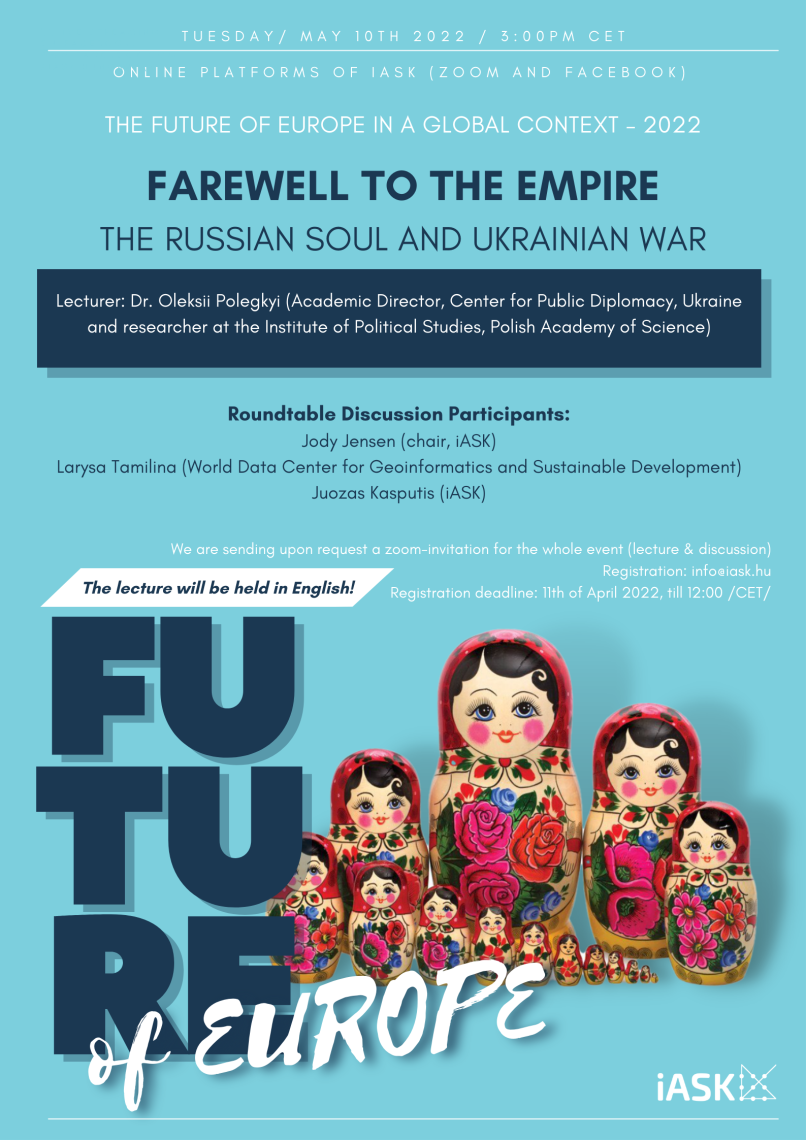Keynote lecturer: Dr. Oleksii Polegkyi (Academic Director, Center for Public Diplomacy, Ukraine and researcher at the Institute of Political Studies, Polish Academy of Science)
Roundtable Discussion Participants:
- Jody Jensen (chair, iASK)
- Larysa Tamilina (researcher, World Data Center for Geoinformatics and Sustainable Development, Ukraine)
- Juozas Kasputis (researcher, iASK)
- Dr. Oleksii Polegkyi (researcher, Polish Academy of Science)
Venue: Online platforms of iASK (Zoom and Facebook)
Date: 10th of May 2022, at 3 p.m. (CET)
The current Russian-Ukrainian conflict can be analyzed as a result of the unfinished disintegration of the Soviet Union in the last 3 decades. Russian revanchism and resentment can be explained as a way to keep power by the Kremlin elite, but also as a last attempt of the dying empire to find its place in the changing world. At the same time, one of the most visible consequences of the last 30 years after the collapse of the Soviet Union is a change in Ukrainian and Russian national identity, values, and political culture.
More information about the participants:
Oleksii Polegkyi (Ukraine) was a research fellow at the Institute of Advanced Studies Kőszeg (iASK, Hungary) from 2016-2017. Today he is the Academic Director at the Center for Public Diplomacy, Ukraine and a researcher at the Institute of Political Studies, Polish Academy of Science. He earned his PhD in Political Science from the University of Wroclaw (Poland) and the University of Antwerp. He publishes articles on post-communist transformations in Eastern Europe, particularly on foreign policy, security and political discourse in Ukraine and Russia.
Juozas Kasputis (Lithuania) is a permanent research fellow at iASK. His research addresses methodological challenges in the social sciences, and the scope of his work covers the philosophy of science and language, semiotics, sociology of knowledge, economics, and the impact on the social sciences of recent developments within natural sciences (especially the implications of complexity theory, quantum mechanics. He specifically scrutinizes the issues of objectivity, linearity, and rationality but is also interested in the history of utopian thought, the topic of determinism and causality.
Larysa Tamilina (Ukraine) received her Ph.D. in Economics and Social Sciences from the Bremen International Graduate School of Social Sciences, in Germany with a dissertation entitled: “The impact of welfare state development on social trust formation: A three-dimensional approach”. She has worked as a Senior Lecturer at the Kyiv Polytechnical University and as a Senior Researcher at the World Data Center for Geoinformatics and Sustainable Development, Ukraine
The event will be held in English!
